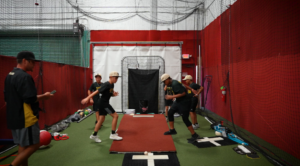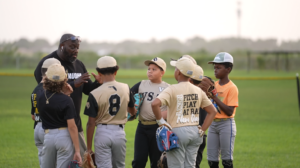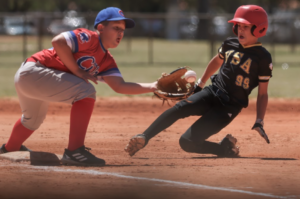To the American people, baseball isn’t just a sport. It’s an emotion that connects millions of fans nationwide and provides employment to countless individuals. In more than a century of its existence, baseball has shaped American culture in more ways than you can imagine.
Did you know that baseball has lent quite a few popular expressions to the English language? Knowing when to use one is often considered a benchmark for a user’s proficiency with the language!
Let’s look at some of the most popular English language expressions borrowed from baseball.

“Touch base”
One of the first things baseball academy coaches teach young players is how to run fast and touch a base. Because in baseball, touching a base is necessary to score a run. But in modern English, “touch base” means contacting someone to discuss something briefly.
“Bench warmer”
In baseball terminology, a “bench warmer” is a player who sits on the bench during a game and rarely plays. In English, the expression means someone not actively participating in a particular activity.
“Don’t be a bench warmer if you want to do something in life!” – this is what experienced baseball academy coaches like Mo Vaughn tell teenagers when they sign up for baseball coaching sessions. The sport’s best coaches don’t just teach how to play baseball. They focus on shaping young players into mentally strong individuals capable of enduring challenges on and off the field.
“In the ballpark”
This is another very popular expression. It is used to give an estimate about something. Take, for instance, the following expression: Expect to spend somewhere in the ballpark of $1000 a night if you stay there. Expressions such as “ballpark figure” or “ballpark estimate” mean a rough estimate about something.
In baseball, the term “ballpark” refers to the stadium or field where a game is being played.
“Play hardball”
When someone is “playing hardball” with you, they are being aggressive or confrontational during an interaction. In baseball, the term refers to the standard ball made of cork or rubber wrapped in leather and used in official matches.
Summer baseball camps often employ a softer ball to reduce the possibility of injuries to young players. But make no mistake; the hardball is the real deal!

“Hit a home run” or just “home run”
When someone “hits a home run,” it means they have overcome a major challenge. To a baseball player, the same expression means hitting the ball out of the park. But as pro coaches at top baseball academies like Vaughn Sports Academy will tell you, hitting isn’t just about showing strength. It also involves patience and strategy.
“Strike out”
“Strike out” is a popular expression used in everyday language to describe a failed attempt at something. The phrase comes from baseball, where a batter is “struck out” when they fail to hit the ball thrice in a row. The term was first used in 1876 and has been a baseball staple ever since.
“Curveball” or “throw a curveball”
A curveball is a type of pitch in baseball where the ball follows a curved path through the air as it leaves the pitcher’s hand. Curveballs often fool hitters into making mistakes and can win matches for teams. In life, however, “curveball” refers to a tricky situation. If someone “throws a curveball” at you, they want to test your problem-solving skills.
“To step up to the plate”
When you “step up to the plate,” you take on a challenge or responsibility. In baseball, when a hitter steps up to the plate in an unfamiliar field or against a tough pitcher, their work is cut out for them. This is precisely where training with pro coaches helps.
Legends like Mo Vaughn work with players to build the mindset required to face tough opponents in high-pressure situations. A strong mindset helps a player score runs or strike out opponents and prepares them for life outside the arena.

“Swing for the fences”
To “swing for the fences” means to take a considerable risk or make an all-out effort to achieve a goal. The expression comes from the idea of a baseball player trying to hit the ball out of the park.
These are just a few examples of baseball terminology being used in everyday language. It’s fascinating to see how a sport with humble origins, such as baseball, can influence entire generations, shape a nation’s culture and influence the people’s language. This nation owes a great debt to those professional coaches who have dedicated their lives to baseball coaching and molding the youth into strong and dependable individuals.


